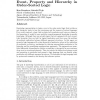Free Online Productivity Tools
i2Speak
i2Symbol
i2OCR
iTex2Img
iWeb2Print
iWeb2Shot
i2Type
iPdf2Split
iPdf2Merge
i2Bopomofo
i2Arabic
i2Style
i2Image
i2PDF
iLatex2Rtf
Sci2ools
106
click to vote
ICLP
1999
Springer
1999
Springer
Event, Property, and Hierarchy in Order-Sorted Logic
Knowledge representation in logics, even in the order-sorted logic that includes a sort hierarchy, tends to lose the conciseness and the nuances of natural language. If we could construct a logic that includes both predicates and terms as classes in the hierarchies, it would be very useful for connecting general knowledge to speci
c knowledge. Although there are actually logics that are equipped with such a predicate hierarchy, they are built by logical implication and they cause the problem of predicate uni
cation between di
erent argument structures. In this paper, we present a logic language with a class hierarchy of predicates, where in the uni
cation of predicates we devise a mechanism for deriving superordinate predicates in the hierarchy and for quantifying supplementary arguments. The arguments are quanti
ed di
erently, depending on whether a predicate is interpreted as an occurrence of an event or a universal property. Thus, we include the distinction between events and prope...
| Added | 04 Aug 2010 |
| Updated | 04 Aug 2010 |
| Type | Conference |
| Year | 1999 |
| Where | ICLP |
| Authors | Ken Kaneiwa, Satoshi Tojo |
Comments (0)

